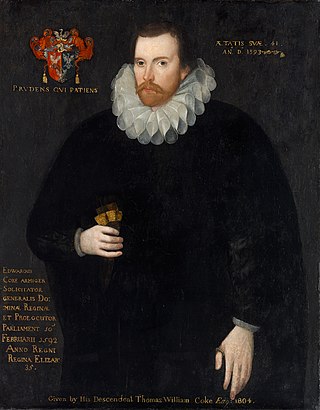Related Research Articles
Natural law is a system of law based on a close observation of human nature, and based on values intrinsic to human nature that can be deduced and applied independently of positive law. According to the theory of law called jusnaturalism, all people have inherent rights, conferred not by act of legislation but by "God, nature, or reason." Natural law theory can also refer to "theories of ethics, theories of politics, theories of civil law, and theories of religious morality."

Property is a system of rights that gives people legal control of valuable things, and also refers to the valuable things themselves. Depending on the nature of the property, an owner of property may have the right to consume, alter, share, redefine, rent, mortgage, pawn, sell, exchange, transfer, give away, or destroy it, or to exclude others from doing these things, as well as to perhaps abandon it; whereas regardless of the nature of the property, the owner thereof has the right to properly use it under the granted property rights.
Property law is the area of law that governs the various forms of ownership in real property (land) and personal property. Property refers to legally protected claims to resources, such as land and personal property, including intellectual property. Property can be exchanged through contract law, and if property is violated, one could sue under tort law to protect it.
A brocard is a legal maxim in Latin that is, in a strict sense, derived from traditional legal authorities, even from ancient Rome. According to the dictionaries, the word is a variant of the Latinized name of Burchard of Worms, Bishop of Worms, Germany, who compiled 20 volumes of Ecclesiastical Rules, although some sources disagree.
A shareholder of corporate stock refers to an individual or legal entity that is registered by the corporation as the legal owner of shares of the share capital of a public or private corporation. Shareholders may be referred to as members of a corporation. A person or legal entity becomes a shareholder in a corporation when their name and other details are entered in the corporation's register of shareholders or members, and unless required by law the corporation is not required or permitted to enquire as to the beneficial ownership of the shares. A corporation generally cannot own shares of itself.
The right of self-defense is the right for people to use reasonable or defensive force, for the purpose of defending one's own life (self-defense) or the lives of others, including – in certain circumstances – the use of deadly force.

Sir Edward Coke was an English barrister, judge, and politician. He is often considered the greatest jurist of the Elizabethan and Jacobean eras.
Escheat is a common law doctrine that transfers the real property of a person who has died without heirs to the crown or state. It serves to ensure that property is not left in "limbo" without recognized ownership. It originally applied to a number of situations where a legal interest in land was destroyed by operation of law, so that the ownership of the land reverted to the immediately superior feudal lord.
Actus reus, sometimes called the external element or the objective element of a crime, is the Latin term for the "guilty act", which, when proving it before the court beyond a reasonable doubt in combination with the mens rea, "guilty mind", produces criminal liability in the common law-based criminal law jurisdictions of England and Wales, Canada, Australia, India, Kenya, Pakistan, South Africa, New Zealand, Scotland, Nigeria, Ghana, Ireland, Israel and the United States. In the United States, some crimes also require proof of an attendant circumstance.
Ownership is the state or fact of legal possession and control over property, which may be any asset, tangible or intangible. Ownership can involve multiple rights, collectively referred to as title, which may be separated and held by different parties.
In Roman law, mancipatio was a solemn verbal contract by which the ownership of certain types of goods, called res mancipi, was transferred.
Mortmain is the perpetual, inalienable ownership of real estate by a corporation or legal institution; the term is usually used in the context of its prohibition. Historically, the land owner usually would be the religious office of a church; today, insofar as mortmain prohibitions against perpetual ownership still exist, it refers most often to modern companies and charitable trusts. The term mortmain is derived from Mediaeval Latin mortua manus, literally "dead hand", through Old French morte main.
In the law of the Middle Ages and early Modern Period and especially within the Holy Roman Empire, an allod, also allodial land or allodium, is an estate in land over which the allodial landowner (allodiary) had full ownership and right of alienation.
A servitude is a qualified beneficial interest severed or fragmented from the ownership of an inferior property and attached to a superior property or to some person other than the owner. At civil law, ownership (dominium) is the only full real right whereas a servitude is a subordinate real right on par with wayleaves, real burdens, security interests, and reservations. There are two types: predial, attaching to property, and personal, attaching to a person.

Ius or Jus in ancient Rome was a right to which a citizen (civis) was entitled by virtue of his citizenship (civitas). The iura were specified by laws, so ius sometimes meant law. As one went to the law courts to sue for one's rights, ius also meant justice and the place where justice was sought.
The phrase law of the land is a legal term, equivalent to the Latin lex terrae, or legem terrae in the accusative case. It refers to all of the laws in force within a country or region, including statute law and case-made law.

Scots property law governs the rules relating to property found in the legal jurisdiction of Scotland. As a hybrid legal system with both common law and civil law heritage, Scots property law is similar, but not identical, to property law in South Africa and the American state of Louisiana.
Dominium means "dominion; control; ownership". It is used in some phrases and maxims in legal Latin:
Dominium directum et utile is a legal Latin term used to refer to the two separate estates in land that a fief was split into under feudal land tenure. This system is more commonly known as duplex dominium or double domain. This can be contrasted with the modern allodial system, in which ownership is full and not divided into separate estates—a situation known as dominium plenum "full ownership".
Ius in re, or jus in re, under civil law, more commonly referred to as a real right or right in rem, is a right in property, known as an interest under common law. A real right vests in a person with respect to property, inherent in his relation to it, and is good against the world. The primary real right is ownership (dominium). Whether possession (possessio) is recognized as a real right, or merely as a source of certain powers and actions, depends on the legal system at hand. Subordinate or limited real rights generally refer to encumbrances, rights of use and security interests. The term right in rem is derived from the action given to its holder, an actio in rem. In Latin grammar the action against the thing demands a fourth case. The underlying right itself, ius in re, has a fifth case, as the right rests on, or burdens, the thing. By mistake the common law terminology now uses the fourth case for describing the right itself. Compare jus ad rem.